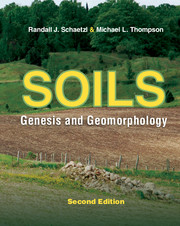17 - Conclusions
Published online by Cambridge University Press: 12 January 2024
Summary
The Importance of Soils
With the exception of ice-covered surfaces and areas of bare bedrock, soils of one kind or another exist on almost every part of Earth's landsurface. The wide variety and range of expression that soils have are truly remarkable, especially when one considers that this plethora of colors, mineral assemblages, and horizon types and sequences is due to the interaction of only a few (five) soil-forming factors. In mathematics, 5 is a small number; 55, which (minimally) reflects the complex interactions among those five factors, is considerably larger (3,125). So it is in soils, as those five soil-forming factors can team together in myriad ways to form a world of soils that is complex, spatially diverse, and manifaceted. Unraveling and explaining that world, or at least some of the better-understood parts of it, have been our goals. Indeed, in the context of its complexity, when we think about it, it should be clear that we still know relatively little about soil and how it functions as a natural system. Yaalon (2000) paraphrased Leonardo da Vinci as stating, “Why do we know more about distant celestial objects than we do about the ground beneath our feet?”
Almost all of our food and sustenance are from the soil. As the saying goes, “If you eat, you are involved in agriculture,” and, we would add, you are also dependent upon the soil. Most of the oxygen that we breathe originates from plants rooted in the soil. Soil is also one of the best natural filters we have. What would our world be like without soil?
The name Adam is from the Hebrew adama, which means earth, or soil. Adam's name, in the Bible's book of Genesis, is meant to capture humankind's intimate link with the soil, to which we are tied while we live, and to which we return upon our death (Hillel 1991). Remember Francis Hole's expression, TNS? Temporarily Not Soil – that is what we are. And what all terrestrial life on this planet is. Clearly, soils have been significant to humankind for as long as we have existed and will be here long after we are gone. The importance of soils cannot be overestimated. Their value cannot be overstated.
- Type
- Chapter
- Information
- SoilsGenesis and Geomorphology, pp. 638 - 640Publisher: Cambridge University PressPrint publication year: 2015

